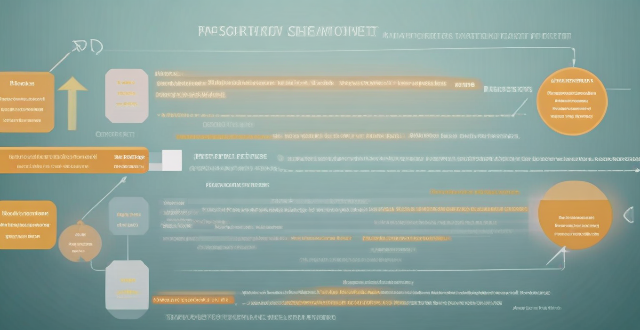Financial Scholarship

How do I maintain my scholarship eligibility ?
Maintaining scholarship eligibility is crucial for students who rely on financial aid to fund their education. To keep your scholarship, it is important to focus on academic performance, GPA maintenance, community involvement, and financial responsibility. Some tips include attending all classes, participating actively, managing time effectively, seeking help when needed, monitoring grades, staying organized, studying consistently, getting involved in campus organizations, showing leadership skills, giving back to the community, budgeting wisely, seeking additional funding, avoiding debt, and saving for emergencies. By following these tips, you can maintain your scholarship eligibility and continue receiving financial aid for your education.

What are the benefits of receiving a scholarship ?
Receiving a scholarship offers significant advantages, including financial relief through reduced educational costs and increased opportunities for employment. Academically, scholarships provide access to quality education and supportive resources. Personally, they enhance skills and confidence while motivating students. Long-term impacts include better career prospects and societal contribution. Overall, scholarships contribute to success and well-being.

What are the tax implications of receiving a scholarship ?
Receiving a scholarship can offset higher education costs, but understanding the tax implications is crucial. Scholarships for tuition, fees, and educational expenses are typically non-taxable, but those covering personal expenses may be taxed. Accurate record-keeping, separating expenses, consulting tax professionals, and planning ahead are key to managing these implications effectively.

What are the common mistakes to avoid when applying for scholarships ?
When applying for scholarships, it's important to avoid common mistakes that could harm your chances of receiving financial aid. Key points include ensuring accuracy and completeness of your application, submitting on time, writing clear and tailored essays, meeting eligibility criteria, customizing each application, seeking recommendations early, showing financial need, not overlooking smaller awards, following up appropriately, and maintaining integrity without plagiarism or dishonesty. By avoiding these pitfalls, you can present yourself as a diligent and deserving candidate for scholarship opportunities.

Can I get a scholarship to attend a prestigious tennis training camp ?
Attending a prestigious tennis training camp can be an excellent opportunity for aspiring athletes to improve their skills and gain exposure to top-level coaching. However, the cost of such camps can be prohibitive for many players. In this article, we will explore whether it is possible to obtain a scholarship to attend a prestigious tennis training camp. Scholarships are financial aid awards that help students pay for college or university tuition fees, books, and other related expenses. They are typically awarded based on academic merit, financial need, or specific talents, such as athletic ability. There are various types of scholarships available, including need-based scholarships, merit-based scholarships, and athletic scholarships. To be eligible for a tennis training camp scholarship, you must demonstrate exceptional athletic ability in tennis. This may include having a high ranking in your age group, winning tournaments, or receiving recognition from coaches or scouts. Most prestigious tennis training camps also require applicants to have a certain level of academic achievement. The first step in applying for a tennis training camp scholarship is to research the available opportunities. This can involve searching online, contacting tennis organizations, or speaking with coaches and mentors in the sport. Once you have identified potential scholarships, you will need to prepare your application materials, which may include transcripts, letters of recommendation, essays or personal statements, and an athletic resume. Obtaining a scholarship to attend a prestigious tennis training camp is certainly possible but requires careful planning and preparation. By understanding the eligibility criteria, researching available scholarships, and preparing a strong application package, you can increase your chances of securing funding for your tennis training goals.

How do I write a successful scholarship application letter ?
This guide provides tips on how to write a successful scholarship application letter, including an introduction that grabs the reader's attention and highlights academic achievements, extracurricular activities, and community involvement. The body of the letter should focus on these areas, highlighting strengths and accomplishments, while the conclusion summarizes main points and reiterates why the candidate is a strong choice for the scholarship. The closing should be polite and include contact information.

How can I increase my chances of getting a scholarship ?
To increase your chances of getting a scholarship, researchTo increase your chances of getting a scholarship, research strong academic record, engage in engage in extracurricular activities and community service, prepare compelling application materials including personal statements and recommendations, and stay organized throughout the application process.

What are the different types of scholarships available ?
Scholarships are financial aid awards that help students cover the costs of college or university education. They come in various forms, each targeting different groups of students based on merit, need, athletic ability, artistic talent, diversity, subject matter, leadership skills, community service, corporate affiliation, local organization membership, religious background, international study goals, and specific career training. Examples include the National Merit Scholarship for academic achievement, Federal Pell Grants for financial need, NCAA athletic scholarships for sports prowess, the Presidential Scholarship in the Arts for artistic talent, the Hispanic Scholarship Fund for diversity, Health Professions Scholarship Program for subject-specific majors, Jack Kent Cooke Foundation Scholarships for leadership and community service, Coca-Cola Scholars Program for corporate relations, Kiwanis Club scholarships for local community members, Catholic Education Foundation Scholarships for religious affiliation, Fulbright Program for international studies, and Nurse Corps Scholarship Program for career-specific training.

Are there any scholarships available for online courses ?
Scholarships for online courses can help make education more accessible and affordable. General, subject-specific, diversity, and need-based scholarships are available. To apply, research opportunities, review eligibility criteria, gather required documents, complete the application process, and follow up on your application.

How do I apply for a scholarship ?
The text provides a step-by-step guide on how to apply for a scholarship, emphasizing the importance of research, eligibility criteria, required documents, application form completion, essay writing, and submission. It stresses the need for accuracy, thoroughness, and timeliness in the application process.

Can I apply for multiple scholarships at the same time ?
Applying for multiple scholarships at the same time is allowed and encouraged to increase financial assistance chances. It's important to research each scholarship's requirements, deadlines, and customize applications accordingly. Tips include creating a spreadsheet, seeking help, and prioritizing applications based on various factors.

How do I find scholarships specific to my field of study ?
Finding scholarships specific to your field of study can be a challenging task, but it is definitely worth the effort. Here are some steps you can take to find scholarships that match your academic interests and career goals: 1. Research your field thoroughly to identify key organizations, associations, and institutions that offer scholarships related to your area of interest. 2. Use online scholarship search engines such as Fastweb, ScholarshipOwl, and Cappex to find scholarships based on your academic achievements, extracurricular activities, and career goals. 3. Check with your school's financial aid office for information about scholarships specific to your field of study and resources such as scholarship databases or lists of local organizations that offer scholarships. 4. Attend scholarship workshops and events hosted by your school or local community organizations to network with professionals in your field and learn about scholarship opportunities. 5. Contact professional organizations and associations in your field directly to find out about available scholarships and application requirements.

Are there any scholarships available for part-time students ?
Part-time students face unique challenges when it comes to financing their education, but there are still scholarships available for them. Need-based scholarships are awarded based on financial need, while merit-based scholarships are awarded based on academic achievement or other criteria. Employer tuition assistance programs may also be an option for part-time students. Tips for applying for scholarships as a part-time student include starting early, being prepared, and following instructions carefully.

Can international students apply for scholarships ?
International students can apply for various scholarships offered by universities and organizations to offset the cost of tuition, books, and living expenses. These include merit-based scholarships awarded based on academic or leadership skills, need-based scholarships considering financial situation, athletic scholarships, diversity scholarships, and first-generation college student scholarships. External organizations like the Fulbright Program and Rotary International also provide opportunities. To apply, research available scholarships, review requirements, prepare application materials, apply early and regularly, and seek additional funding sources.

How do I renew my scholarship for the next academic year ?
To renew your scholarship for the next academic year, you need to understand eligibility criteria, note deadlines, gather necessary documents, submit your application, and follow up. If not approved, explore alternative funding or appeal.

Can extracurricular activities help in getting scholarships for college ?
**Extracurricular Activities and College Scholarships** This article explores the role of extracurricular activities in securing scholarships for college. It highlights how these activities help in developing essential life skills, showcasing talents, and building a strong resume, which are highly valued by scholarship committees. The article also discusses specific ways in which extracurricular activities can aid in getting scholarships, such as demonstrating leadership skills and academic achievements, enhancing personal statements, and increasing scholarship opportunities. Overall, it emphasizes the importance of participating in extracurricular activities throughout one's academic journey to improve chances of receiving college scholarships.

What are some common mistakes people make when planning an education budget ?
Planning an education budget is crucial for achieving academic and professional goals, but common mistakes can cause financial difficulties. Mistakes include underestimating costs by failing to account for all expenses or ignoring hidden fees, overlooking future opportunities like extracurricular activities or networking events, misjudging financial aid and scholarships, disregarding potential income sources such as part-time work or skill-based services, and inadequate contingency planning without an emergency fund or considering changes in personal circumstances. Avoiding these pitfalls can lead to a more realistic and effective education budget that supports your academic journey without unnecessary stress or debt.

How does Fintech impact financial inclusion ?
Fintech has revolutionized financial services, making them more accessible and affordable. It has increased accessibility for unbanked populations, lowered costs, improved efficiency, driven innovation, enhanced security, promoted financial literacy, facilitated inclusion initiatives, enabled digital identity verification, supported microfinance and crowdfunding, and promoted mobile money and payment systems. These advancements have significantly impacted financial inclusion worldwide.

What are the eligibility criteria for scholarships ?
Scholarship eligibility criteria include academic performance, financial need, community involvement, leadership roles, demographic factors, and other specific requirements related to creative work or professional goals.

How can I maintain my financial freedom once I achieve it ?
The text discusses strategies for maintaining financial freedom, including creating a budget and sticking to it, building an emergency fund, investing wisely, living below one's means, and continuously learning and growing. It emphasizes the importance of discipline, planning, and effort in sustaining financial independence.

What is the impact of financial regulation on innovation in the financial sector ?
Financial regulation plays a critical role in the innovation landscape of the financial sector, with both positive and negative impacts. Positively, it promotes transparency and trust, encourages responsible innovation, and facilitates access to capital. However, it can also slow down the pace of innovation, restrict experimentation, and stifle international competitiveness. To mitigate these negative effects, adaptive regulation, collaborative approaches, and education and training are recommended. Striking a balance between fostering innovation and ensuring safety is crucial.

What is the relationship between financial regulation and financial stability ?
The relationship between financial regulation and financial stability is crucial for the proper functioning of the economy. Financial regulation, consisting of laws and guidelines, aims to ensure the safety and soundness of the financial system and protect consumers. Financial stability, on the other hand, refers to a condition where the financial system can withstand shocks without significant disruptions. Financial regulation affects financial stability in several ways: 1. It prevents financial fraud and misconduct by enforcing strict rules and penalties, maintaining public trust in the financial sector. 2. It promotes transparency and disclosure, allowing stakeholders to make informed decisions and enabling regulators to monitor the financial system effectively. 3. Regulators encourage sound risk management practices, such as capital requirements and stress testing, contributing to overall financial stability. 4. They maintain market integrity by promoting fair competition and preventing monopolistic behavior, ensuring confidence in the financial system. 5. Regulators address systemic risks through macroprudential policies, safeguarding against widespread financial instability. In conclusion, financial regulation plays a vital role in maintaining financial stability by preventing fraud, promoting transparency, encouraging sound risk management, maintaining market integrity, and addressing systemic risks. However, finding the right balance between regulation and innovation is crucial for achieving both regulatory effectiveness and financial stability.

What is the impact of financial regulation on global financial markets ?
Financial regulation is vital for maintaining stability and efficiency in global financial markets. It influences market stability by reducing volatility and preventing crises, improves risk management through enhanced transparency and control over high-risk practices, protects investors from fraud and unfair trading practices, and fosters innovation while ensuring safety and compliance. This balance is crucial for the health and growth of the global economy.

How can I ensure that my education budget plan is sustainable in the long term ?
Proper planning and management of an education budget are crucial for ensuring its long-term sustainability. Here's how you can achieve that: * Establish clear goals that are specific, measurable, achievable, relevant, and time-bound (SMART). * Conduct a thorough analysis of your current financial situation, projected costs, and sources of funding. * Create a comprehensive plan that includes budget allocation, revenue streams, and expense tracking. * Review and adjust the plan periodically to adapt to changes in personal circumstances, market conditions, or educational requirements. * Seek professional advice from financial advisors and education counselors to ensure the best outcomes.

How do financial regulations impact banks and other financial institutions ?
Financial regulations are crucial for maintaining stability in the banking and financial sector. They protect depositors' interests, promote fair competition, prevent financial crises, and impact innovation and efficiency. Regulations like capital adequacy ratios, liquidity coverage ratios, and stress testing ensure depositors' safety. Antitrust laws and consumer protection laws encourage fair competition among banks. Prudential supervision and Basel III help prevent financial crises. However, excessive regulation may negatively affect innovation and profitability. Striking a balance between safety and promoting innovation is key.

How can governments encourage and improve financial literacy among citizens ?
Governments can encourage financial literacy by implementing education programs, offering accessible financial services, and enforcing consumer protection regulations. This will help citizens make informed decisions about their money, investments, and debts.

What role does financial literacy play in achieving wealth growth ?
Financial literacy is essential for wealth growth, encompassing budgeting, saving, investing, retirement planning, and credit management. By understanding these aspects, individuals can make informed financial decisions, reduce debt, build wealth, and achieve long-term financial stability.

In what ways does financial literacy affect personal finance management ?
Financial literacy is crucial for managing personal finances effectively, as it helps individuals understand basic financial concepts, promotes prudent budgeting and spending habits, shapes savvy saving and investing strategies, and facilitates efficient debt management.

What is financial regulation ?
The text discusses the concept of financial regulation, which is a set of rules and guidelines that govern the operations of financial institutions. The primary objectives are to ensure stability and integrity of the financial system, promote fair dealing, protect consumers, and prevent financial crises. Key components include prudential regulation, market conduct regulation, consumer protection, systemic risk oversight, structural regulation, regulation of market infrastructure, and international coordination. Purposes of financial regulation are to ensure stability, promote transparency, protect consumers, facilitate efficiency, and prevent criminal activity. Methods of financial regulation include rulemaking, supervision, inspection, capital requirements, and liquidity requirements. Challenges in financial regulation include balancing oversight with innovation, keeping pace with technology, and international coordination.

Can anyone achieve financial freedom ?
Financial freedom, a state where one's passive and active income covers living expenses without regular time-for-money exchanges, is a goal many strive for. Key factors for achieving it include education, saving habits, smart investing, debt management, multiple income streams, avoiding lifestyle inflation, long-term planning, and the right mindset. Actionable steps include budgeting, automated savings, early investing, continuous learning, and networking with like-minded individuals. While not everyone may achieve financial freedom due to varying circumstances, it is attainable for those who are committed and strategic in their approach.